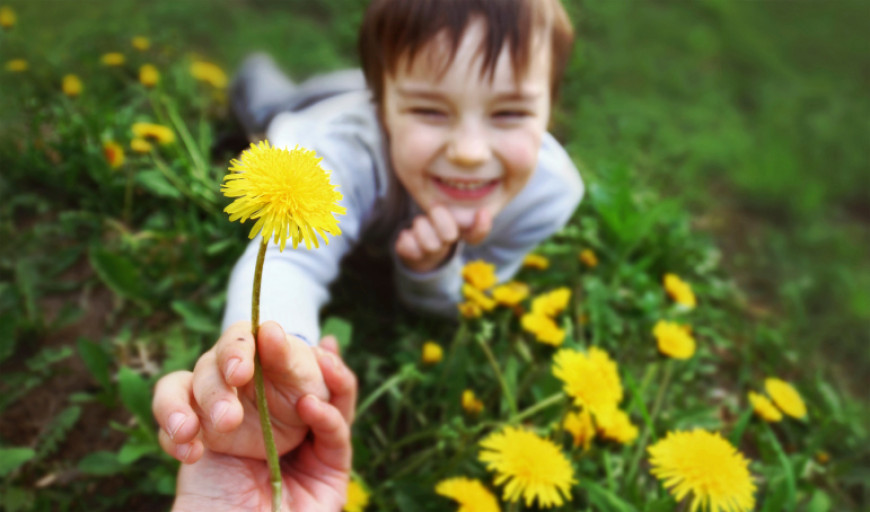Time Required
These steps gradually help children contemplate forgiveness by building their understanding and skills over time. Parts of this practice, such as reading a picture book and talking about it, can take as little as 15 to 20 minutes.
How to Do It
Psychologist Robert Enright, Ph.D., and psychiatrist Richard Fitzgibbons, M.D., define forgiveness as responding to unfair, hurtful treatment by abandoning resentment and cultivating beneficence, including feelings of compassion or acts of generosity. Forgiveness doesn’t necessarily include condoning, excusing, tolerating, or forgetting the behavior, nor accepting an apology or reconciling with the offender. It's simply a personal choice to let go of negative feelings and cultivate more positive ones.
In researching forgiveness for over three decades and implementing forgiveness programs for both adults and children throughout the world, Enright suggests how to begin to talk about forgiveness with your young children:
Starting at about age six, children can understand the causes and effects of people’s actions. Because of this advance in reasoning, you as a parent now can begin to systematically introduce them to the idea of forgiveness. There are five sequential steps you can take to help young children become rather sophisticated in their understanding and practice of forgiveness.
- You can introduce the theme of inherent worth or the idea that all people—no matter who they are, how rich or poor they are, or how smart they are—have value. Each person is special, unique, and irreplaceable. You can introduce this concept apart from forgiveness and through picture books like Dr. Seuss’s Horton Hears a Who! This is a helpful story for introducing inherent worth because of the repeated theme: “A person is a person no matter how small.”
- Before introducing the theme of forgiveness itself, you can lay a further foundation by exposing children to the themes of kindness, respect, generosity, and love. You can continue this learning apart from forgiveness and through story books.
- Once young children know about worth, kindness, respect, generosity, and love, you can then introduce them to forgiveness, but only through stories and not through their own experience of forgiving those who hurt them. You can explain forgiveness this way: When people forgive, they are kind to those who are not kind to them. When people forgive, they try to show respect to those who have not shown respect to them. When people forgive, they try to be generous to those who have not been generous to them. When people forgive, they try to be loving to their family members even if the family members are not loving to them, at least at the moment.
- You can be very clear to young children that to forgive does not mean automatic reconciliation. Sometimes, a child must stay away from another child if the latter is continually bullying. The one who is being bullied needs to tell an adult.
- Parents can then apply all of this learning to children themselves, but only if they are ready and only if they choose to consider forgiveness. Forgiveness is a choice and should not be pressured. For those who are ready, they can draw on what they have learned from the picture books and consider seeing the other who acted unjustly as possessing worth. For those who are ready, they can then consider offering kindness, respect, generosity, and love toward the offending person.
Because these steps require time, they should be continued for the next several years, using new stories so that the learning deepens in different contexts.
Why You Should Try It
Children will sometimes be hurt or betrayed by other children (or adults). You can teach your children about forgiveness to help them envision the possibility of a peaceful path forward and healing after wrongdoing.
Children and teens who learn about forgiveness tend to be more forgiving, hopeful, and empathic. They are less likely to feel anger and depression, act with aggression, and perceive others as hostile. Apart from better emotional well-being, young people who forgive also tend to perform better academically.
Why It Works
Forgiveness is a difficult and complicated process, even for adults. These steps provide a roadmap to help your children understand and navigate it, if they choose to. They begin with concepts that are related to forgiveness and easier for kids to understand, eventually building up to an attempt to forgive.
Forgiveness offers children a way to think about what to do after someone wrongs them, and to potentially get relief from intense hurt and negative emotions like sadness, anger, resentment, and the desire for vengeance.
Evidence That It Works
Enright, R. D., Knutson, J. A., Holter, A. C., Baskin, T., & Knutson, C. (2007). Waging peace through forgiveness in Belfast, Northern Ireland II: Educational programs for mental health improvement of children. Journal of Research in Education, 17(1), 63-78.
First- and third-grade children who participated in a forgiveness program led by school teachers and psychologists felt less negative emotions like anger and depression, and were more forgiving toward those who had previously hurt them, compared to children who did not participate in the program.
Enright, R. D., & Fitzgibbons, R. P. (2015). Forgiveness therapy: An empirical guide for resolving anger and restoring hope. Washington, D.C.: American Psychological Association.
This comprehensive book for researchers and clinicians outlines the science behind forgiveness, provides guidance on how the process of forgiveness can offer healing, and explains how to support children and adults in forgiveness therapy.
Sources
Robert Enright, Ph.D., University of Wisconsin-Madison
Parents are also role models for their children's forgiveness. How forgiving are you? Take our Forgiveness quiz to find out.







Comments
and Reviews
Aderinola
Very insightful.
Yajuan
Mahammet Muhammet
Kutallahfa Mana da lura da kawo cigaba baki daya
The Greater Good Toolkit
Made in collaboration with Holstee, this tookit includes 30 science-based practices for a meaningful life.
The Greater Good Toolkit
Made in collaboration with Holstee, this tookit includes 30 science-based practices for a meaningful life.